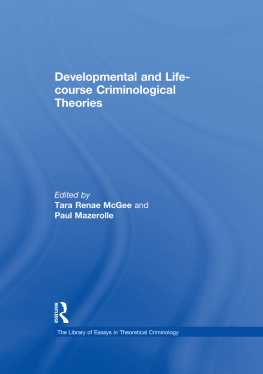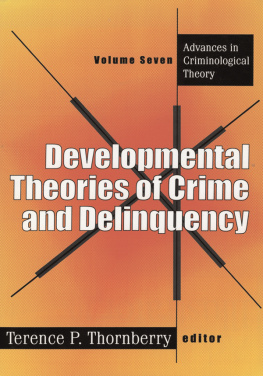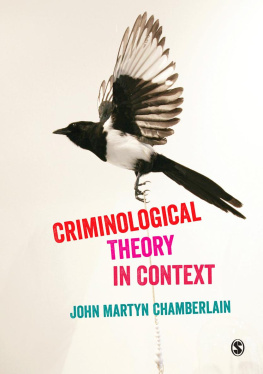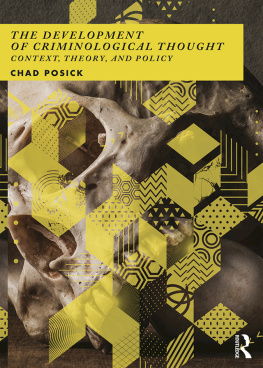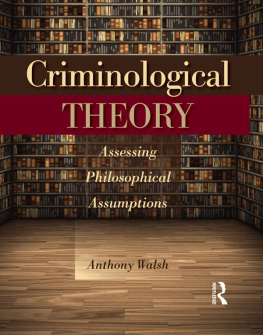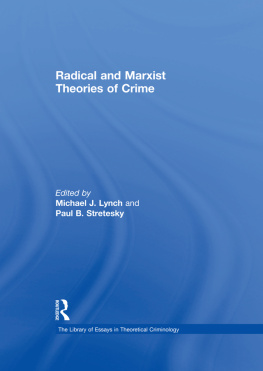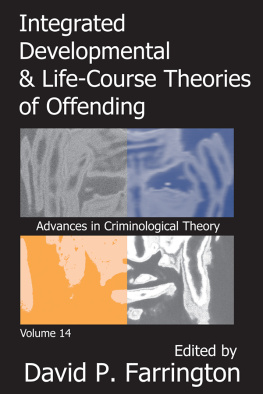Developmental and Life-course Criminological Theories
The Library of Essays in Theoretical Criminology
Series Editor: Stuart Henry
Titles in the Series:
Anomie, Strain and Subcultural Theories of Crime
Robert Agnew and Joanne M. Kaufman
Postmodernist and Post-Structuralist Theories of Crime
Bruce A. Arrigo and Dragan Milovcinovic
Biosocial Theories of Crime
Kevin M. Beaver and Anthony Walsh
Feminist Theories of Crime
Meda Chesney-Lind and Merry Morash
Cultural Criminology: Theories of Crime
Jeff Ferrell and Keith Hayward
Social Constructionist Theories of Crime
Stuart Henry and Ross L. Matsneda
Radical and Marxist Theories of Crime
Michael J. Lynch and Paul B. Stretesky
Developmental and Life-course Criminological Theories
Tara Renae McGee and Paul Mazerolle
Crime Opportunity Theories
Mangai Natarajan
Social Control and Self-Control Theories of Crime and Deviance
Joseph H. Rankin and L. Edward Wells
Social Learning Theories of Crime
Christine S. Sellers, L. Thomas Winfree, Jr and Ronald L. Akers
Social, Ecological and Environmental Theories of Crime
Jeffery T. Walker
First published 2015 by Ashgate Publishing
Published 2016 by Routledge
2 Park Square, Milton Park, Abingdon, Oxon OX14 4RN
711 Third Avenue, New York, NY 10017, USA
Routledge is an imprint of the Taylor & Francis Group, an informa business
Copyright Tara Renae McGee and Paul Mazerolle 2015. For copyright of individual articles please refer to the Acknowledgements.
All rights reserved. No part of this book may be reprinted or reproduced or utilised in any form or by any electronic, mechanical, or other means, now known or hereafter invented, including photocopying and recording, or in any information storage or retrieval system, without permission in writing from the publishers.
Notice:
Product or corporate names may be trademarks or registered trademarks, and are used only for identification and explanation without intent to infringe.
Wherever possible, these reprints are made from a copy of the original printing, but these can themselves be of very variable quality. Whilst the publisher has made every effort to ensure the quality of the reprint, some variability may inevitably remain.
British Library Cataloguing in Publication Data
A catalogue record for this book is available from the British Library.
Library of Congress Control Number: 2014939103
ISBN 9780754629641 (hbk)
Ashgate would like to thank our researchers and the contributing authors who provided copies, along with the following for their permission to reprint copyright material.
The American Psychological Association for the essay: G.R. Patterson, Barbara D. DeBary she and Elizabeth Ramsey (1989), 'A Developmental Perspective on Antisocial Behaviour', American Psychologist , , pp. 329-35. Copyright 1989 by the American Psychological Association. Reproduced with permission.
The American Society of Criminology for the essays: Robert J. Sampson and John H. Laub (2003), 'Life-course Desisters? Trajectories of Crime among Delinquent Boys Followed to Age 70', Criminology, , pp. 555-92; Ronald L. Simons, Chyi-in Wu, Rand D. Conger and Frederick O. Lorenz (1994), 'Two Routes to Delinquency: Differences between Early and Late Starters in the Impact of Parenting and Deviant Peers', Criminology, , pp. 247-76; David S. Kirk (2012), 'Residential Change as a Turning Point in the Life Course of Crime: Desistance or Temporary Cessation?', Criminology, , pp. 329-57. Copyright 2012 American Society of Criminology; Hanno Petras, Paul Nieuwbeerta and Alex R. Piquero (2010), 'Participation and Frequency during Criminal Careers across the Life Span', Criminology, , pp. 607-37. Copyright 2010 American Society of Criminology; Megan C. Kurlychek, Shawn D. Bushway and Robert Brame (2012), 'Long-term Crime Desistence and Recidivism Patterns Evidence from the Essex County Convicted Felon Study', Criminology , , pp. 71-103. Copyright 2012 American Society of Criminology.
Oxford University Press for the essay: Per-Olof H. Wikstrom, Dietrich Oberwittler, Kyle Treiber and Beth Hardie (2012), 'Situational Action Theory', in Breaking Rules: The Social and Situational Dynamics of Young People's Urban Crime, Oxford: Oxford University Press, pp. 3-43. By permission of Oxford University Press.
SAGE Publications for the essays: Christopher J. Sullivan and Paul Hirschfield (2011), 'Problem Behavior in the Middle School Years: An Assessment of the Social Development Model', Journal of Research in Crime and Delinquency , , pp. 566-93. Copyright 2011 The authors. Reprinted by permission of SAGE Publications; Victor van der Geest, Arjan Blokland and Catrien Bijleveld (2009), 'Delinquent Development in a Sample of High-risk Youth: Shape, Content, and Predictors of Delinquent Trajectories from Age 12 to 32', Journal of Research in Crime and Delinquency, , pp. 111-43. Copyright 2009 SAGE Publications. Reprinted by permission of SAGE Publications; Andr M. van der Laan, Martine Blom and Edward R. Kleemans (2009), 'Exploring Long-term and Short-term Risk Factors for Serious Delinquency', European Journal of Criminology, , pp. 419-38. Copyright 2009 The authors. Reprinted by permission of SAGE Publications; Robert Svensson, Lieven Pauwels and Frank M. Weerman (2010), 'Does the Effect of Self-control on Adolescent Offending Vary by Level of Morality? A Test in Three Countries', Criminal Justice and Behavior, 37, pp. 732-43. Copyright 2010 International Association for Correctional and Forensic Psychology. Reprinted by permission of SAGE Publications; Robert J. Sampson and John H. Laub (2005), 'A Life-course View of the Development of Crime', Annals of the American Academy of Political and Social Sciences , 602, pp. 12-45. Reprinted by permission of SAGE Publications; Michael R. Gottfredson (2005), 'Offender Classifications and Treatment Effects in Developmental Criminology: A Propensity/Event Consideration', Annals of the American Academy of Political and Social Sciences , 602, pp. 46-56.
Springer Science+Business Media for the essays: J. David Hawkins and Joseph G. Weis (1985), 'The Social Development Model: An Integrated Approach to Delinquency Prevention', Journal of Primary Prevention , , pp. 73-97. Copyright 1985 Human Sciences Press; Raymond Paternoster, Charles W. Dean, Alex Piquero, Paul Mazerolle and Robert Brame (1997), 'Generality, Continuity, and Change in Offending', Journal of Quantitative Criminology , , pp. 231-66. Copyright 1997 Plenum Publishing Corporation; Bianca E. Bersani, John H. Laub and Paul Nieuwbeerta (2009), 'Marriage and Desistance from Crime in the Netherlands: Do Gender and Socio-historical Context Matter?', Journal of Quantitative Criminology, , pp. 3-24. Copyright 2008 Springer Science+Business Media, LLC.
Transaction Publishers for the essay: David P. Farrington (2005), 'The Integrated Cognitive Antisocial Potential (ICAP) Theory', in D.P. Farrington (ed.), Integrated Developmental and Life-course Theories of Offending , New Brunswick, NJ: Transaction Publishers, pp. 73-92. Copyright 2005 by Transaction Publishers. Reprinted by permission of the publisher.


